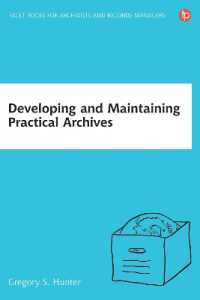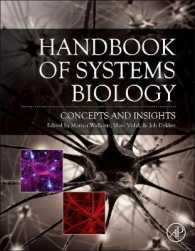Full Description
Pakistan at Seventy-Five investigates the countrys multi-layered issues in the context of a post-colonial polity marked by diversity, heterogeneity, stratification and volatility. This wide-ranging discourse engages with diverse formal and informal actors as markers of identity, historical events and social conditions, as well as global geo-political and neo-colonial centreperiphery relations that shape narratives about the nation and the constructions of a sense of belonging. The editors and contributors utilise multi-faceted and multi-layered approaches, focusing on (1) identities, and questions of diversity and pluralism; (2) horizontal and vertical technologies and geographies of power related to questions of trust, legitimacy, participation, and governance; and (3) the distribution, deprivation and vulnerability of sociocultural, political, and human resources. Studying Pakistan has been subject to different approaches, including decolonial, indigenous, and feminist perspectives. This volume draws out alternative epistemological and methodological viewpoints: the insideroutsider conundrum, centreperiphery asymmetries, hegemonic discourses, and practices within Pakistans national/international academy. The chapter contributions are the outcome of a unique interdisciplinary research cooperation at Quaid-i-Azam University, focussing on early career researchers. Presenting a multiplicity of voices and trajectories, Pakistan at Seventy-Five provides new input to existing debates and directions for future scholarly endeavour. Contributors: Aftab Nasir, Andrea Fleschenberg, Arslan Waheed, Salman Rafi Sheikh, Sanaa Alimia, Sarah Holz, Sohaib Bodla, Wajeeha Tahir.
Contents
Series Editor's Preface
Acknowledgments
Introduction. Nation-building in Pakistan: An Outline of Narratives and Academic Discussions - Sarah Holz
Development Discourses and Urban Poor: A Case Study of the Capital Development Authority (CDA) and Katchi Abadis of Islamabad - Arslan Waheed
English: An Advantage or a Barrier? Reproduction of Discourses of Inequality through Education - Aftab Nasir
'Afghan, Pakistani, or Both?' How Afghan Migrants Are Reshaping Identity in Pakistan and the Diaspora - Sanaa Alimia
Exploring Identity through Episodic Interviews: Conceptions, Perceptions and Negotiations among Students of Quaid-i-Azam University Islamabad - Wajeeha Tahir
Contestation, Cooperation and Consensus: The Council of Islamic Ideology as a Platform for Consensus Building? - Sarah Holz
Ideology and Identity: Pakistan's Ideological Engineering and Baloch Nationalism - Salman Rafi Sheikh
Experiencing Control of a Post-Colonial Garrison State: An Appraisal of Nation Building and Resistance in Gilgit-Baltistan - Sohaib Bodla
Conclusion.
Reflecting Critical Knowledge Production and Social Sciences within an (Inter-) National, Decentred Research Cooperation on 'Ideas, Issues and Questions of Nation-building in Pakistan' - Andrea Fleschenberg
The Editors and Contributors
Index








